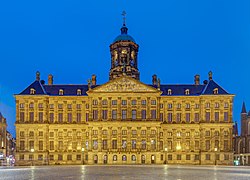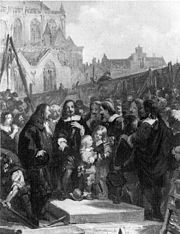| Royal Palace of Amsterdam | |
|---|---|
| Koninklijk Paleis van Amsterdam Paleis op de Dam | |
 The Royal Palace of Amsterdam in 2016 The Royal Palace of Amsterdam in 2016 | |
| Interactive fullscreen map | |
| Former names | Stadhuis op de Dam |
| General information | |
| Architectural style | Dutch Baroque architecture |
| Location | Amsterdam, Netherlands |
| Address | Nieuwezijds Voorburg 147 |
| Coordinates | 52°22′23.2″N 4°53′29.0″E / 52.373111°N 4.891389°E / 52.373111; 4.891389 |
| Current tenants | King Willem-Alexander |
| Construction started | 1648 |
| Completed | 1665 |
| Inaugurated | 20 July 1655 |
| Cost | ƒ 8.5 million |
| Owner | Kingdom of the Netherlands |
| Technical details | |
| Floor area | 22,031 square metres (237,140 sq ft) |
| Design and construction | |
| Architect(s) | Jacob van Campen, Daniël Stalpaert |
| Other designers | Artus Quellinus, Govert Flinck, Jacob Jordaens, Jan Lievens, Ferdinand Bol |
| References | |
|
| |
The Royal Palace of Amsterdam in Amsterdam (Dutch: Koninklijk Paleis van Amsterdam or Paleis op de Dam) is one of three palaces in the Netherlands which are at the disposal of the monarch by Act of Parliament. It is situated on the west side of Dam Square in the centre of Amsterdam, opposite the War Memorial and next to the Nieuwe Kerk.
The palace was built as a city hall during the Dutch Golden Age in the 17th century. The building became the royal palace of King Louis Bonaparte and later of the Dutch Royal House.
History
Town hall

The structure was built as the Town Hall of the City of Amsterdam "facing the landing wharfs along Damrak, which at that time would have been busy with ships". The town hall was opened on 29 July 1655 by Cornelis de Graeff, the mayor of Amsterdam. De Graeff's son Jacob de Graeff laid the foundation for this along with three other children. The main architect was Jacob van Campen, who took control of the construction project in 1648. It was built on 13,659 wooden piles.
Palace
After the patriot revolution which swept the House of Orange from power a decade earlier, the new Batavian Republic was forced to accept Louis Bonaparte, brother of Napoleon Bonaparte, as King Louis I of Holland in 1806. After holding his court at The Hague and Utrecht, Louis Napoleon moved to Amsterdam, and converted the Town Hall into a royal palace for himself.
It was made property of the Kingdom of the Netherlands in 1936.
The palace is used by the monarch for entertaining and official functions during state visits and other official receptions, such as New Year receptions. The award ceremonies of the Erasmus Prize, of the Silver Carnation, of the Royal Awards for Modern Painting, and of the Prince Claus Awards are also held in the palace.
The balcony of the Royal Palace was used during the investiture of Queen Beatrix in 1980, where her mother Juliana announced the new queen to the people.
The palace was renovated from 2005 until June 2009, during which, among other things, asbestos was removed. Since 14 June 2009, the palace is open again to visitors.
Notable features
The sandstone of yellowish hue has darkened considerably in the course of time. Astride the rear of the building is a 6-metre-tall statue of Atlas carrying the Globe on his shoulders.
Gallery
-
 Moses Room
Moses Room
-
 Schepen Room
Schepen Room
-
 Vierschaar
Vierschaar
-
 bedroom King Louis Bonaparte
bedroom King Louis Bonaparte
-
 Main hallway
Main hallway
-
 Front side
Front side
-
 The central hall of the palace
The central hall of the palace
References
- ^ The Royal Palace, Amsterdam Archived 18 May 2011 at the Wayback Machine. The Dutch Royal House. Retrieved on 18 February 2011.
- ^ Martin Dunford (2010). The Rough Guide to The Netherlands. Penguin. pp. 63–64. ISBN 978-1-84836-882-8.
- Berlitz (March 2017). Berlitz Pocket Guide Amsterdam (Travel Guide eBook). ISBN 978-1-78573-023-8.
- Frijhoff, Willem; Spies, Marijke (2004). Dutch Culture in a European Perspective: 1650, hard-won unity. ISBN 978-90-232-3963-5.
- Geert Mak, Eymert-Jan Goossens. 350 jaar geschiedenis op de Dam. Amsterdam, 2005. P. 109.
- Renovatie Paleis op de Dam in opbouwfase. Ministry of Housing, Spatial Planning and the Environment. Retrieved on 18 February 2011.
- "Atlas". Archived from the original on 3 September 2017. Retrieved 3 September 2017.
External links
- Official website
- Virtual tour of the Royal Palace of Amsterdam provided by Google Arts & Culture
- [REDACTED] Media related to Royal Palace of Amsterdam at Wikimedia Commons
| Amsterdam | |
|---|---|
| By topic | |
| Boroughs & areas | |
| Government | |
| Transportation | |
| Culture | |
| Education | |
| Parks and open spaces | |
| Religious sites | |
| Royal palaces in the Netherlands | ||
|---|---|---|
| Occupied |  | |
| Historical | ||
- Dam Square
- Baroque palaces in the Netherlands
- Buildings of the Dutch Golden Age
- Domes
- Museums in Amsterdam
- Historic house museums in the Netherlands
- Houses completed in 1665
- Marble buildings
- Palaces in the Netherlands
- Rijksmonuments in Amsterdam
- Royal residences in the Netherlands
- 1665 establishments in the Dutch Republic
- Louis Bonaparte